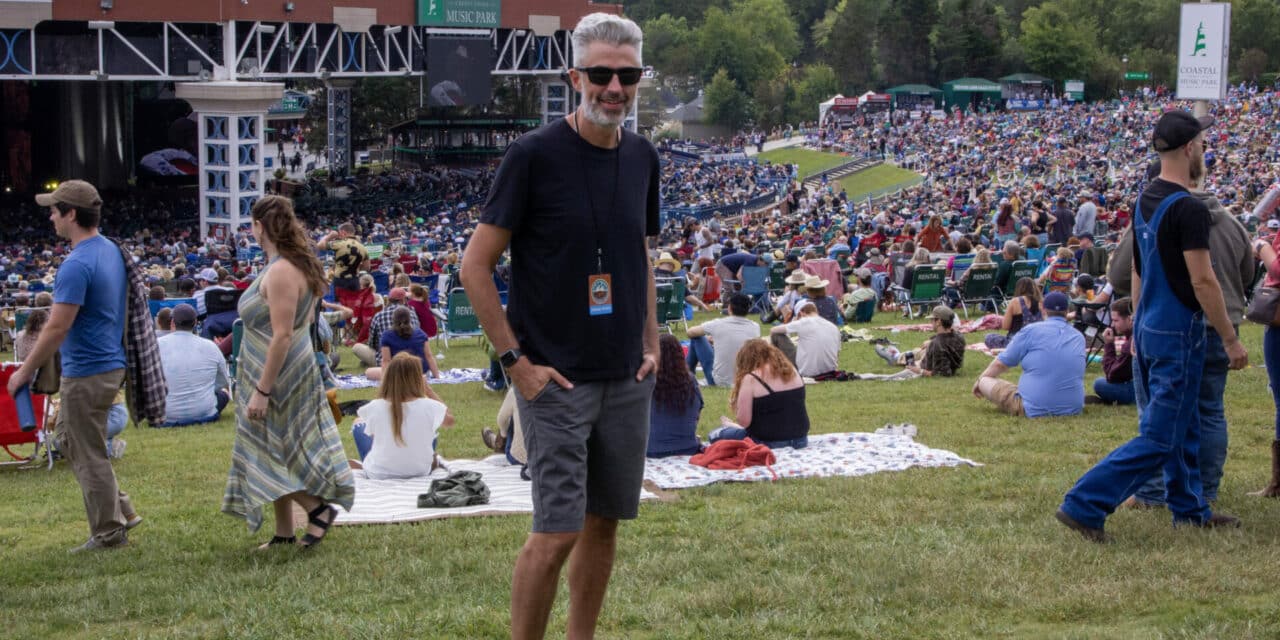HANDS-ON HOSPITALITY: Tom See at Farm Aid 2022 at Live Nation’s Coastal Credit Union Music Park at Walnut Creek in Raleigh, N.C. (Photo by Amanda Howard)
Hospitality Mentality Hammered Home Early For New Jersey Native
Tom See, chief operating officer of Live Nation Venues, is all about customer service, and that includes artists and fans alike.
A New Jersey native who developed an affinity for Disney-style service with a smile at a young age while vacationing with his family, See went on to work at Walt Disney World, first as an attraction attendant but eventually as director of Adventures by Disney. He helped develop and launch Disney’s family vacation business, and later served as vice president of Universal Studios Hollywood.
He joined Live Nation as chief revenue officer in 2015, became president of Live Nation Amphitheaters in 2018 and in 2021 rose to his current position leading business operations and revenue performance for Live Nation’s more than 100 venues.

Pollstar & VenuesNow: Tell me a bit about yourself, where you were born and raised and how you made your way into the live entertainment business?
Tom See: I’m a Jersey kid, from North Plainfield. When I was growing up I either wanted to pitch for the New York Yankees or work for Disney. I was blessed and fortunate to go down to Disney twice as a kid. We would drive down and I was fascinated even as a kid at how they took care of people. Everyone was friendly. It was amazing. When we left I would say to my father, “Why don’t you work here, where it all seems pretty damn cool and easy?” He said, “Life doesn’t work that way.” And I said, “Maybe one day I’ll make that happen.”
I look at it as I never worked in live entertainment, I worked in hospitality for my entire career, including now. I got that start in college when I got to work at Walt Disney World at Epcot Center as an attractions host making $5 an hour. I never left the industry.
I’ve been very fortunate to have a great track record working for Disney and Universal and got to do a lot of cool gigs in between before I got to Live Nation.
Did you go to school in Florida?
First, I went to school in Pennsylvania. I got my two-year degree at a junior college called Keystone, which is north of Scranton, where they send bad kids. A small junior college, I went into my dorm at this majority community school and it was like a little penitentiary college. But it was great to get isolated and worry about living in a dorm and acclimating and showing up and going to school. That’s where I got my two-year. I interviewed with Disney with a mullet and you couldn’t have long hair, so I said in my interview I would cut it, of course, if I got hired. And lo and behold I had to change my style to go work for them. And then I went to Eastern Illinois University.
You knew you wanted to work in hospitality when you were young?
I never wanted to work somewhere where I felt I was having to work and I wanted to work somewhere that people were having fun. No one shows up to Disney or Universal feeling like, I don’t want to be here. I didn’t want to surround myself with a crew I had to work with and have to talk about real-world shit, to be honest with you. I want to talk about fun and making sure that people are having fun. There’s business in between and what I didn’t realize when I was younger, is that there are people behind the scenes that were actually pulling the strings to make sure all of this was happening. My first job as an attractions host was putting people on rides and all that stuff and I realized, wow, there is actually this business side to the fun. I then, in college, started to understand and did internships with Disney on the business side, the corporate side. That’s how I started to pivot away from the pure fan experience and more to the business side.
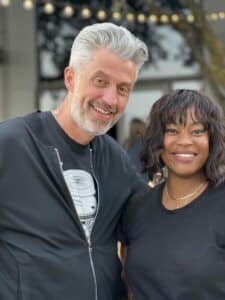
GOOD FITZ: Tom See & Noelle Scaggs of Fitz and the Tantrums and Founder of Diversify the Stage. (Courtesy photo)
In what ways did the experiences at Disney and later at Universal Studios Hollywood prepare you for what you would do at Live Nation for the better part of the last decade?
At the end of the day, it’s how do you service millions of people? And whether it’s 10 or
10 million, it comes down to, how do we take care of one another? Throughout my journey I’ve been afforded more and more opportunities to look after more and more people. What started as the foundation of understanding how to load five people on an attraction and doing it over and over again really well, to then trying to figure out how to optimize the entirety of one’s experience. And then how do you do that with others is probably the biggest transition. At Live Nation, where it’s 100 venues-plus with a whole bunch of GMs and a very decentralized experience, you really have to lead through an amazing crew. So, through that journey of life I was afforded those opportunities.
Were there challenges you overcame personally or professionally to get to where you are today?
Being adaptable and accepting change are key elements, but also transitioning to live music. As you get more established in your career, sometimes you might get pigeonholed. Here I was 20 years into a career that was dominated mainly by theme park and theme park language. I thought I would have to go to a whole other industry school to learn what the vernacular is with people and promoters and deal-making and understanding a whole new spectrum that I had to immerse myself in—not to mention the very decentralized business of Live Nation and building those relationships around the country. Getting on planes every week. Meeting people. Listening and listening more and then absorbing and having to make their lives better and easier. That was probably the most challenging situation I had put myself in, that transition.
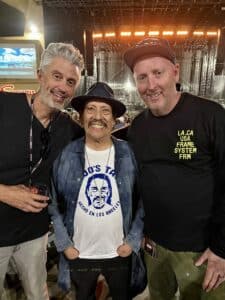
MACHETE: Tom See, left, mingles with actor Danny Trejo and Andy Yates, head of live nation food and beverage. (Courtesy Live Nation)
How did the opportunity arise to go from the theme park world to concerts?
I was at Universal Studios in Hollywood and I was actually part of a team that determined that Universal Amphitheatre didn’t make the most business sense at (Universal Studios Hollywood), only being operated 50-75 times a year. It would be better as Hogwarts Castle and welcome to the Wizarding World of Harry Potter. So, I was on this team that literally destroyed an amphitheater and lo and behold, about four months prior to us opening up the attraction, my phone rang. It was a recruiter who said that Live Nation was looking for someone to bring that hospitality touch to the business. I’m a big live music fan and I love to travel so I had to return that call. I had done my reign at Universal. I was looking for something else and thought it could potentially be the perfect marriage. I went and met the executive team. Ironically, when I was at Universal, Live Nation CEO Michael Rapino would film things there for MSNBC and CNBC and I would always listen to quarterly earnings reports and interviews because I always felt like Live Nation was in the hospitality business, but didn’t strike me as being quite there yet. It was one of those companies on my short list where, if the opportunity ever came up to work with Michael, I would jump at the chance. He’s a pretty dynamic individual and an amazing CEO.
Do you have guiding principles that govern how you operate in life and business?
The biggest one is, “Inspect what you expect.” I say it all the time with the team. It’s like, if you expect something, you better inspect it. Make sure. Be there. Go out there. And anyone who knows me or follows me on crazy social media knows that I’m out there all the time at our venues, meeting with fans, our crew, artists, their crew. Inspecting. What are we doing and how are we doing it? Where are we doing great and where can we improve? If we’re not doing something great, we’ve got to fix it. And if we are, how do we multiply that and do it everywhere? Inspect what you expect is key when you run a decentralized business. You really need everyone firing on that same cylinder.
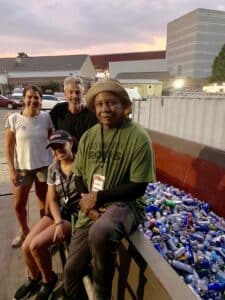
Do you have any mentors you would care to mention and what did they impart?
Tough one. There are a lot of people in your career and sometimes the foundation comes when you are at your youngest. There was an amazing leader I had early in my career. Her name is Brenda Johnson. She was leader when I was a coordinator. I was fresh out of college. Got this hourly paying gig, an assistant and a coordinator for three people, and she spoke real. She gave me truth, honest feedback, as hard as you possibly could be. She really educated me on follow-up and follow-through. Even though you did something, if you don’t tell somebody that you did it, you didn’t follow up. There are certain things that were established pretty young for me that I still to this day, in the back of my mind, I’m like, “Oh, Brenda, Brenda, Brenda.” She believed in me. She was the first leader who was like, “I’m going to get you out of that hourly role. I’m going to move you, give you more responsibility.” Then you get that first pay break and I’m like, “Oh, my God, I’m starting to make something of a career out of what I want to get into.” Great mentor.
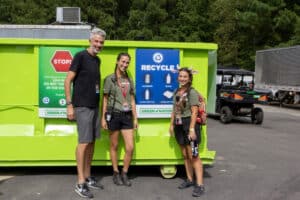
Do you find yourself in the mentor role these days?
You never know when you are in one, but yeah, I just try to be myself and hope that I’m inspiring some people and making them think a little different. I never really think about it as mentoring, but I’m sure there’s a list of individuals who might consider me as one.
During the darkest days of the pandemic, with the industry shut down, were there rays of hope that kept you going? Where did you find inspiration amidst that calamity?
We were in March, April, May of 2020 thinking we were going to get part of the summer in. Then we realized this isn’t going to happen and it got to about the middle of May and I was like, “I’ve got to stage a show. I’m getting anxiety.” The majority of our team is furloughed. We’re on these Zooms and we got to create some happiness for some people and we’ve got to do it at a big scale. So we took this triangle of the country and said wouldn’t it be great if we could do a show in Indianapolis, and St. Louis and maybe Nashville or Chicago? People were chirping about it, but then we literally did it. Over Zooms and with a whole lot of love and passion we staged the largest live music shows (in Nashville; Maryland Heights, Missouri; and Noblesville, Indiana July 10-12, 2020) during the pandemic over a weekend where we had thousands of people. Brad Paisley headlined all three of them. We got him anchored in through Brian O’Connell (Live Nation’s president of country touring). He was like, “You’re going to pull this off, right?” Nelly played, Darius Rucker, Jon Pardi, Yacht Rock Revue. When everyone was craving live music, our team, I couldn’t be more proud of them, staged the safest, largest drive-ins on the planet at that time with formidable artists and it gave everybody a little bit of hope and a little bit of a reprieve. It’s one of the things I will look at in my career and say that was something I would never want to do again, but it was pretty special.
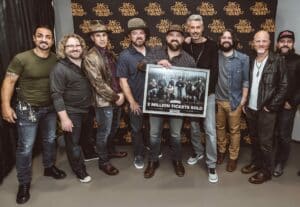
ALL-AROUND GUY: Tom See congratulating Zac Brown Band for selling 3 Million tickets at Live Nation venues. (Courtesy Live Nation)
What’s your sense of where the concert industry and Live Nation’s considerable share of it stands now in this post-pandemic period and what lies ahead, in your view?
Part of my job and our team’s job is to look after artists out on tour, to make sure artists have the best time when they’re on the road and it’s hassle-free and frictionless and that they leave saying, “I want to go play that venue again,” because the artist had a great time and the fans had a great time. If that works, all boats rise and we continue to do that time and time again. I love working with new artists who’ve maybe never been to our venues before and welcome them and their fans. We look at new markets. During the pandemic, people moved all over the country and some of these markets that don’t have venues are craving live music so we’ve got our ear to the ground trying to figure out how to take artists to new places and establish a footprint where maybe there’s not a big live footprint at all. But it’s artists first. How we make sure we provide a connection between the artist and the fan, and make sure we continue to build on that relationship is the key component.
Do you have a favorite amphitheater within or outside the Live Nation orbit?
Going to a concert is incredibly communal. You remember concerts you go to not only for the artist on stage, but the people that you come with. When you move it outdoors, there is that third component that all of a sudden happens that’s visceral. Now you’re in this space that’s very different. There is nothing like driving into Washington to the Gorge. It’s like, “Wow, I am at God’s amphitheater.” And there’s nothing like taking that long parkway drive to Jones Beach; or I’m in Chicago (at Huntington Bank Pavilion) right by the Lake and all of a sudden I’m transported into a venue and seeing the biggest stars on the planet. Those are three that quickly stand out. I can’t pick just one. You go from Chicago to Alpine Valley (Music Theatre in Wisconsin) and you’re looking at the mountains sitting there with 30,000 other people listening to Rage Against the Machine. It’s pretty amazing.
